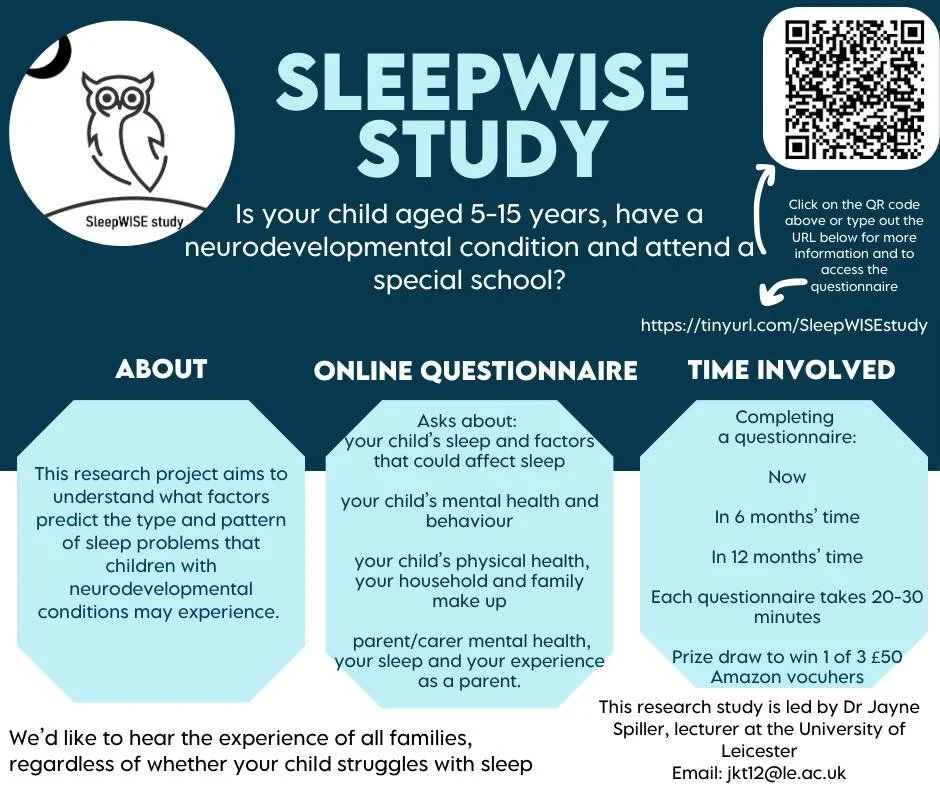A number of studies at currently investigating sleep in people with Down syndrome. Contact the Research team directly for more details.
SleepWISE study
This research projects aims to understand what factors predict the type and pattern of sleep problems that children with neurodevelopmental conditions may experience. This information is needed in order to develop an intervention to support children’s sleep in the future. This project is being led by Dr Jayne Spiller and other researchers from the University of Leicester and the University of Southampton.
This research study involves completing an online questionnaire at three time points; now, in 6 months’ time and in 12 months’ time. The questions will ask about your child’s sleep and factors that could affect sleep, your child’s mental health and behaviour, your child’s physical health, your household and family make up, parent/carer mental health, your sleep and your experience as a parent.
The first questionnaire will take around 20-30 minutes to complete, the second questionnaire in 6 months’ time will take around 20 minutes to complete and the third questionnaire in 12 months’ time will take around 20 minutes to complete.
You are invited to take part in this study if your child is aged 5-15 years, has a neurodevelopmental condition and attends a special school. We want understand the experience of all families, regardless of whether or not you think that your child has a sleep problem.
As a thank you for your time, you will be entered into a prize draw to win one of three £50 Amazon vouchers.
You can find more information about the study, and access the first questionnaire here: https://tinyurl.com/SleepWISEstudy
If you have any questions, please don’t hesitate to contact Jayne via email: jkt12@le.ac.uk you can find more information about the study team and an introductory video to the study via this link: Home (sleepwisestudy.co.uk)
Down’s syndrome and Alzheimer’s -Alzheimer's Research UK
(article credit to Alzheimer’s Research UK)
One interesting study is looking for volunteers to investigate sleep patterns in people with and without Down’s syndrome, and whether they can tell us more about how the brain is affected by Alzheimer’s disease.
How are Down’s syndrome and Alzheimer’s linked?
Sadly, people with Down’s syndrome are more likely to develop Alzheimer’s. They are also more likely to develop it at a younger age. Around half of people with Down’s syndrome develop memory and thinking problems in their 50s.
Down’s syndrome is caused by an extra copy of chromosome 21, which is present at birth.
A chromosome is a group of genes. Genes contain instructions for making proteins, which are the building blocks of our body’s organs. A toxic protein called amyloid builds up in the brains of people with Alzheimer’s, and is thought to trigger a chain of events that lead to damage and brain cell death.
The instructions that lead to amyloid production are stored within chromosome 21. As people with Down’s syndrome are born with an extra copy of chromosome 21, they have an extra copy of this gene. This means that more amyloid is likely to build up in their brains. In fact, almost everybody with Down’s syndrome has early Alzheimer’s-related changes in their brains by age 30.
Can getting a good night’s sleep delay dementia?
We already know that almost half of dementia cases worldwide could be prevented or delayed through lifestyle changes. But there isn’t as much robust research into whether these changes can delay symptoms in people with rare genetic forms of the condition, like in Down’s syndrome.
Because people with Down’s syndrome are at a much higher risk of Alzheimer’s, looking for ways to mitigate this added risk or delay symptoms is vital in the search to understand the diseases that cause dementia.
That’s why Alzheimer’s Research UK is funding a study is looking into how sleep quality affects the brain in people with Down’s syndrome, and whether these changes are linked to Alzheimer’s. At the moment, we know there’s a link between poor sleep quality over a long period of time and dementia, but we don’t know whether it’s a risk factor or an early symptom of the condition.
What is the study looking at?
By monitoring volunteers with and without Down’s syndrome, Dr Stephanie Brown and her team at the University of Cambridge are investigating whether the amount and quality of sleep can speed up or slow down Alzheimer’s-related changes in the brain. This will help to untangle the relationship between sleep and dementia and find out whether improving our sleep quality could reduce our risk of, or delay, dementia.
Dr Brown’s study is looking for people to take part through Join Dementia Research.
Join Dementia Research is not a research study itself but a place to find out about studies that are looking for people like you to enrol and take part. Anyone over the age of 18, with or without dementia, can sign up to find out which studies they can take part in. Signing up to the register is not a commitment to take part in any particular study, it just allows researchers to find willing volunteers.
